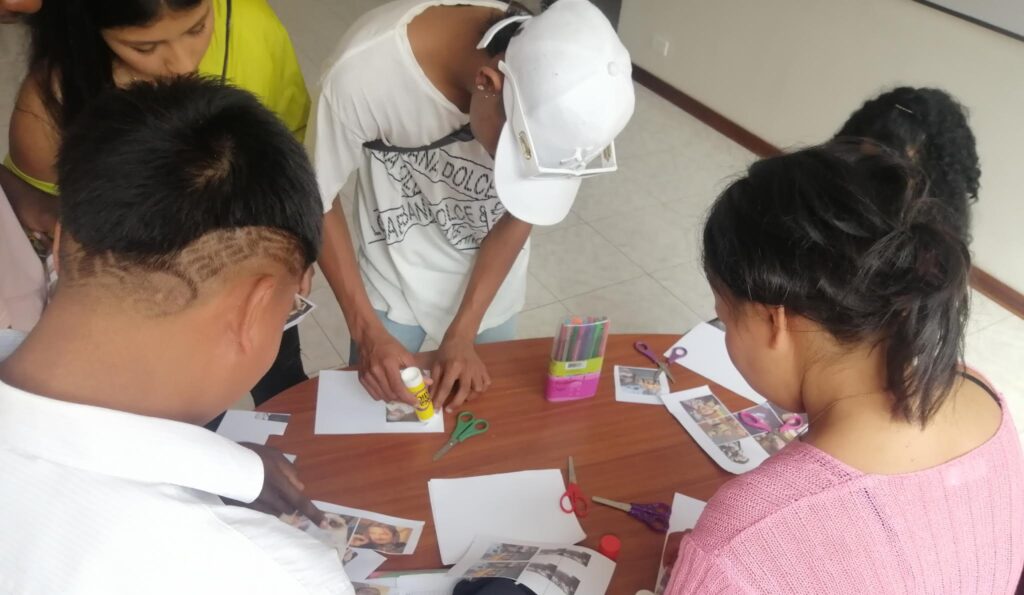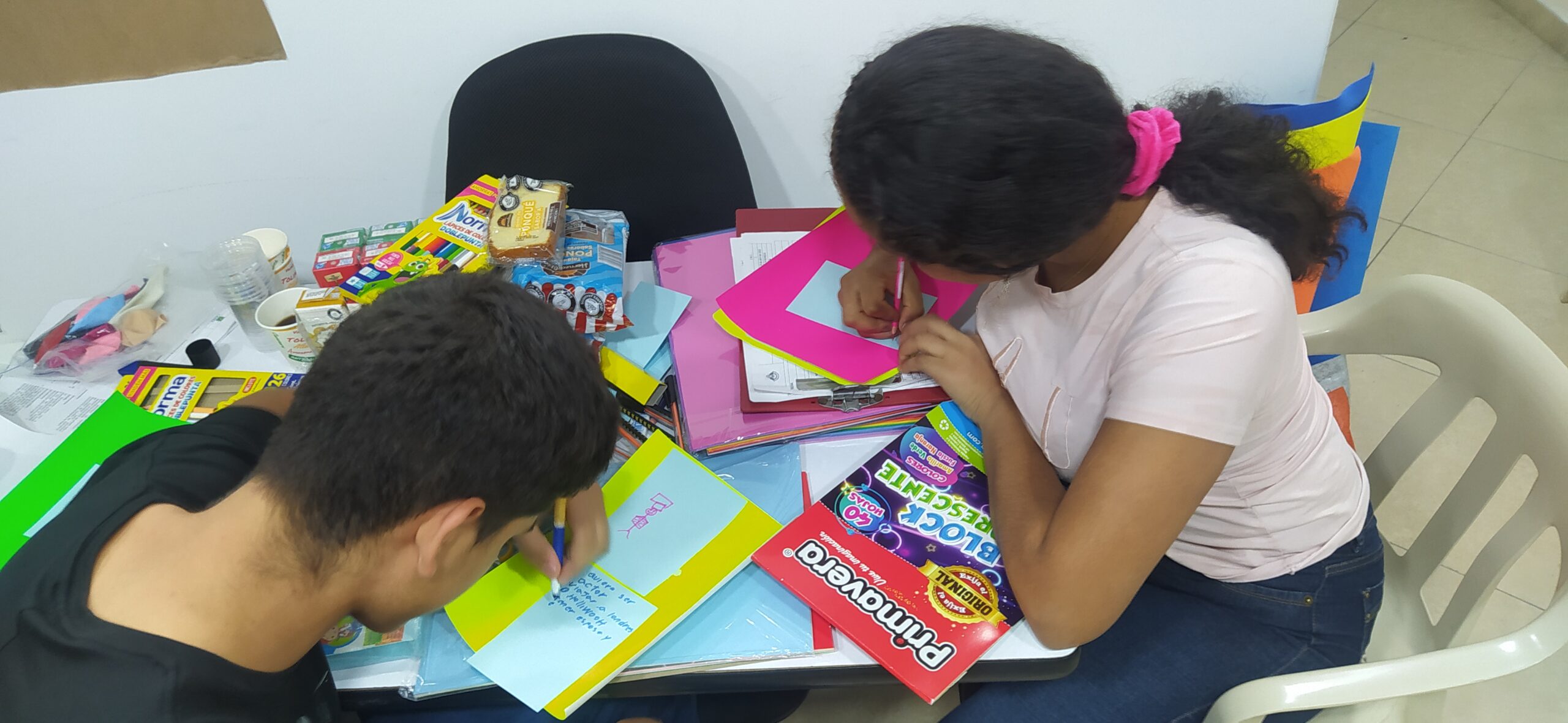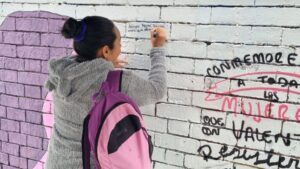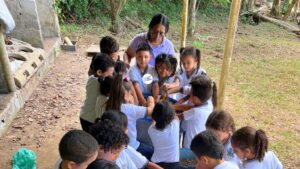Forced recruitment in Colombia is as urgent an issue today as it ever has been. While the country grapples with its history of recruitment, with ex-FARC commandants giving evidence and testimony in front of the Special Jurisdiction for Peace (JEP), cases of child recruitment continue to rise. Tackling this issue is one of our core priorities here at Children Change Colombia, and through several projects across the country, we aim to prevent this trend from increasing.
Child Recruitment and Abuse
The numbers are staggering. Between 1996 and 2006, ex-FARC leaders recognised the forced recruitment of at least 18,677 minors, 30% of whom were under 15. During a similar period, right-wing paramilitary groups are estimated to have also recruited around 2,700 children. The Commission of Truth estimates that, taking into account the potential underreporting due to threats and stigmatisation, the total number of victims could be as high as 30,000 up to 2017.
Many children are lured or coerced into armed groups by force or through promises to take them out of a life of poverty, and once recruited, are compelled to commit atrocities in order to prove their allegiance, with those who refuse risking violence and punishments. Some children who are caught escaping are killed to set an example to others, and even if they successfully leave, children who have been recruited are left with deep-seated trauma. This can make it hard to reintegrate into their communities, and children who struggle to rejoin general society face the possibility of returning to armed groups, as it may be the only way they know to live.

In this context, the JEP tribunal in July is a significant moment in Colombia’s ongoing investigation into the violence and practices that have plagued the country for decades. On the one hand, numerous ex-FARC leaders taking responsibility for the practice of recruiting children is a positive step in the right direction, yet at the same time, their denial of extensive sexual violence undermines the power of their apology. The JEP report contradicts the ex-commandants’ comments that cases of such cases of abuse were few and far between, highlighting numerous cases of rape, sexual slavery, and forced abortions across the FARC ranks. In its investigations, the JEP spoke with 805 victims of sexual violence, and reported that at least 35% of girls recruited reported sexual abuse, and in addition, 24% of all victims recruited reported intra-group gender-based violence, mainly affecting women and children from diverse backgrounds.
Juan Manuel Martínez, lead lawyer of the victims’ team at the JEP, has criticised the ex-FARC leadership for engaging in a form of denial, stating that their statements have not matched up with the victims’ expectations. Now it is up to the JEP to decide whether the statements made by the six constitute a sufficient depiction of the truth.
Recruitment in 2025
These revelations come against the backdrop of a huge increase in child recruitment over the last 5 years, particularly in the wake of COVID-19. In the period after the Colombian government and the FARC signed the 2016 peace agreement, reports of child recruitment fell, with the total estimated number well below the peak of 1,320 in 2000.
However, due to a range of factors, including the impact of the COVID-19 pandemic, child recruitment is on the rise. Between 2021 and 2024, the number of reported recruits rose from 37 children to more than 400, according to the Ombudsman’s Office, roughly a 1,000% increase. The International Committee of the Red Cross’s 2024 annual report also paid special attention to rising child recruitment, with 58% of people interviewed living in conflict-affected areas reporting child recruitment as the main protection risk in their community.
Social media such as TikTok and Facebook are also being increasingly used to recruit minors, with videos and posts aiming to glamourise the lifestyle of being part of armed groups. According to the JEP, certain posts linked to armed groups have received up to 625,000 views, and this new recruitment strategy shows no sign of stopping. This issue made global headlines in June when a 15-year-old was arrested for the attempted assassination of Colombian senator Miguel Uribe, which has further put the spotlight on the continuing role of minors in Colombia’s conflict.
Children Change Colombia projects

At Children Change Colombia, combating child recruitment is one of our key aims, and we have several active projects focused on addressing this issue:
Youth Reintegration into Society: A Community-Based Approach to Mental Health: Together with our partners CRAN and Tiempo de Juego, we provide a community-based approach to psychological care, trauma and reintegration to help children at risk of joining gangs and victims of forced recruitment. CRAN provides foster homes and psychological support to children formerly associated with illegal armed groups, and Tiempo de Juego gives young people in the juvenile justice system and residential homes activities such as sport and art to help them manage their emotions. Through these means, we aim to improve positive relations within communities and help vulnerable children recovering from their experiences of child recruitment.


Football for Peace: Alongside our partners ACADESAN, Fútbol Pazífico, InderValle and GIZ, we are harnessing the power of football to keep children in Valle del Cauca, Cauca, Nariño and Chocó away from armed groups and illegal activities. Through sports, the children can connect with one another and their communities to gain a sense of trust and belonging. The project provides training to local sports coaches to teach children about peace-building, gender equality, and to develop their social-emotional skills.
Our New Project: Rewriting the Future
We are excited to share the upcoming launch of our latest initiative aimed at preventing the forced recruitment of minors. In response to the rising use of social media as a tool for targeting and influencing young children to join armed groups, we will use some of the same strategies to instead promote inspiring local role models and a positive vision for young people in rural communities. At the heart of this project is a commitment to showing children that their future can be shaped by possibility, not fear. As project leader Sira Støhrmann explains,
“Child recruitment in Colombia remains alarmingly high and has escalated in recent years, with social media giving recruiters new ways to target children. Through this three-year project with CRAN, and with support from LACT, we’re determined to break that cycle protecting at-risk youth, helping survivors rebuild their lives, and empowering communities to keep children safe both offline and online”

Why this matters:
While recognition of past crimes is essential, they must also translate into action now to stop this terrible practice from continuing. Reports of children taking part in and affected by violence across Colombia continue to rise, meaning our work has never been more urgent, to help both those already affected and to prevent others from having to experience it in the future.
If you’d like to support our projects, follow this link here, or if you are considering donating, find more information at DONATIONS.
References:
- El Espectador https://www.elespectador.com/colombia-20/jep-y-desaparecidos/cifras-de-reclutamiento-forzado-de-menores-y-violencia-sexual-de-las-farc-investigadas-por-la-jep-noticias-hoy/
- Child Rights International Network https://archive.crin.org/en/library/news-archive/colombia-2700-cases-child-recruitment-paramilitaries.html
Colombia Truth Commission https://www.comisiondelaverdad.co/el-informe-final-en-cifras
International Committee of the Red Cross https://www.icrc.org/sites/default/files/media_file/2025-04/Humanitarian%20Report.pdf
UN Human Rights Office https://www.hchr.org.co/wp/wp-content/uploads/2025/06/07-10-2025-Information-note_ENG.pdf
The Guardian https://www.theguardian.com/world/2025/jun/27/colombia-gangs-luring-children-join-via-tiktok-un-warns
Written by: Arthur Mawer – CCC Projects Intern





